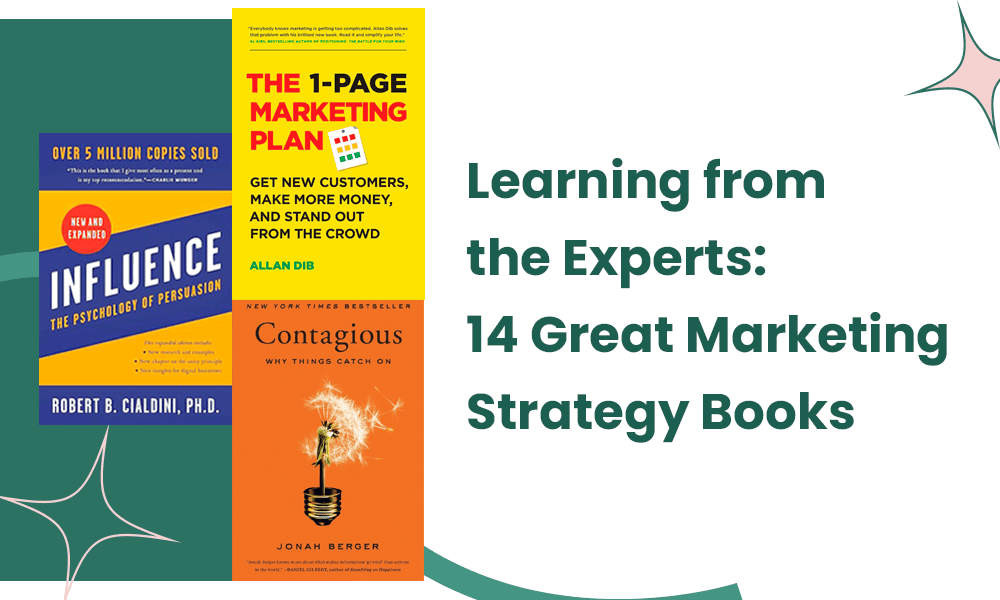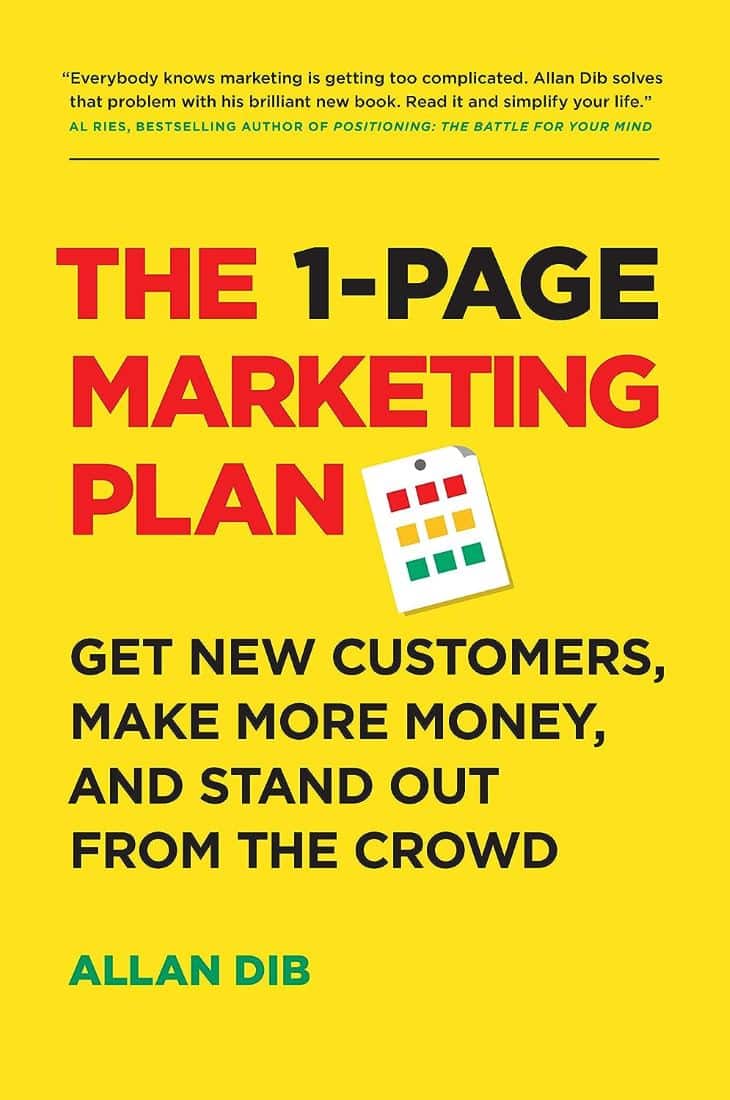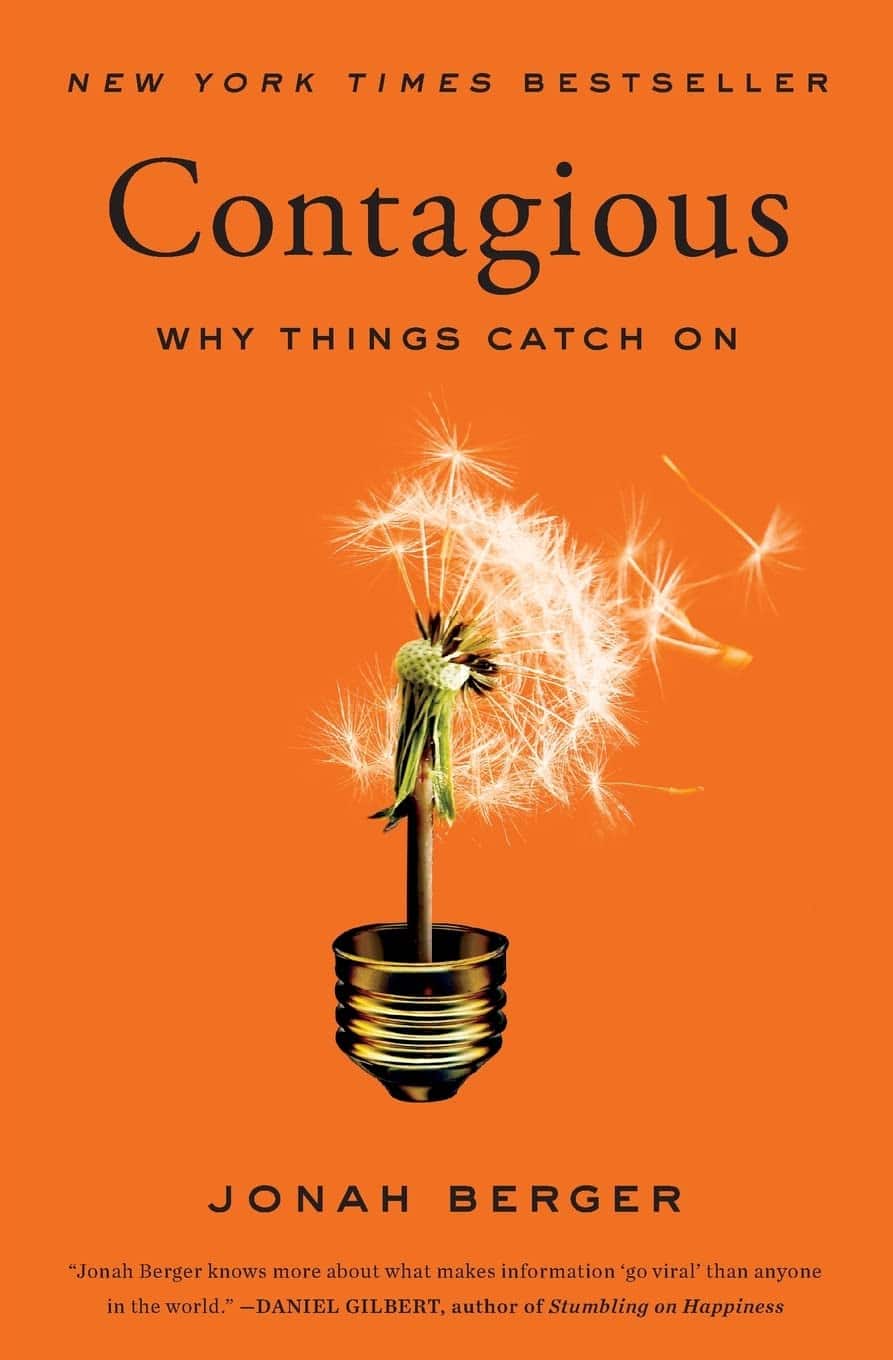Not everybody can join a private marketing mastermind group or hire a coach. However, you don’t want to get behind the curve at a time when marketing strategy is evolving almost every day. For most small business owners, the next best alternative is – you guessed it – marketing strategy books.
Why?
Because they provide actionable ideas from credentialed experts that you can skim through quickly, apply to real-world scenarios, and adapt as needed.
The best part is they come in all shapes and sizes. So, if you want to learn or refresh the basics, start with marketing strategy books for beginners. If you’re looking for contemporary advice, you can pick up a bestseller from gurus like Daniel Kahneman.
In this blog post, we bring you our pick of the best marketing strategy books ever written. We’ve divided the list into three categories- marketing strategy books for beginners, contemporary books on marketing, and books on niche marketing strategies.
These will give you a well-rounded perspective into the foundational principles of marketing strategy and how they have evolved in recent times. Let’s get started.
Table of Contents
Marketing Strategy Books for Beginners
In this section, we’ve included some of the best marketing strategy books of all time. They contain evergreen marketing wisdom that is as relevant today as decades ago.
1. Influence: The Psychology of Persuasion by Robert Cialdini
If you’ve been struggling with low engagement rates, perhaps it’s time to brush up your knowledge of human psychology and persuasive communication. Robert Cialdini’s book, Influence: The Psychology of Persuasion decodes the reasons why people say ‘yes’.
He provides strategies for marketers to make effective use of these factors in driving engagement and conversion. The book has plenty of real-world examples you can apply right away.
What you’ll learn
Reciprocity
Give before you get. It obliges people to return the favor, increasing the odds of a sale.
Commitment and consistency
Get people to make a small commitment, and they’ll keep engaging with you. For example, signing up for a demo, free trial, or webinar.
Social proof
People tend to make decisions based on what they see others doing. Use social proof to influence customer perceptions.
Authority
People generally trust those in positions of authority. Associate with influential brands and people to enhance your credibility.
Liking
People buy from people they like. Tailor their messages to the needs of the audience.
Scarcity
Create FOMO (Fear Of Missing Out) in the minds of the consumer.
2. The 22 Immutable Laws of Marketing: Violate Them at Your Own Risk by Al Reis and Jack Trout
If you’ve been grappling with how to position or differentiate your brand, this classic has the answers. The 22 Immutable Laws of Marketing talks about the fundamentals of successful marketing strategies. Some of the context may be a bit dated, but the core principles are still relevant today.
What you’ll learn
The Law of Leadership
This law states that you can build better brand recall by finding ways to differentiate yourself from the market leader.
The Law of Mind
If you can get customers to perceive you as a market leader, they won’t care whether or not you started first in the market.
The Law of Focus
Build a positive brand association in the minds of the audience. It could be between your brand name and a logo, product feature, emotion, or personality.
The Law of Exclusivity
Once you have a positive brand association, you can build on it to differentiate yourself from similar brands in your niche.
The Law of Sacrifice
Give up something to gain something. Position yourself as a specialist in one particular area to stand out from the competition.
3. The 1-Page Marketing Plan: Get New Customers, Make More Money, And Stand out From The Crowd by Alan Dib
Alan Dib tells it like it is – good marketing doesn’t have to be complicated. In this book, he sets out a framework to create simple, effective marketing plans. By leveraging these strategies, you can create clarity on what to do and why. You’ll be able to align your marketing strategy to your overall business objectives better.
What you’ll learn
Before, during, and after framework
How to structure your marketing strategy around the awareness, consideration, and conversion stages of the sales funnel.
Selecting target markets
Focus on segments that fit your ICP the best. This is where your marketing efforts can have the greatest impact.
Compelling offers
Make sure your value proposition is clear, tailor your offer to different ICPs, and create urgency with limited-time discounts.
Match channels and tactics
Choosing the right mix of online and offline marketing strategies to drive growth.
Streamline budgeting and metrics
Identify the right metrics and KPIs for performance management and use data-based insights to allocate the marketing budget.
Implement automation strategically
When and how to automate marketing campaigns and boost efficiency.
4. The 22 Immutable Laws of Branding: How to Build a Product or Service Into a World-Class Brand by Al Ries and Laura Reis
This is not just another marketing strategy book; it’s a blueprint for anybody who wants to learn how to create a unique brand identity that resonates with customers. To Al and Laura Reis, creating differentiation is key to surviving increased competition and driving growth over time.
What you’ll learn
Law of Expansion
To build a memorable brand, avoid extending your brand to unrelated categories.
Law of Contraction
Focus on one niche to avoid creating confusion in the audience’s minds.
Law of Publicity
It takes time to build positive brand associations. The key is to be consistent with your messaging.
Law of the Word
Successful brands ‘own’ a single word that encapsulates the essence of the brand and distinguishes it from competitors.
Law of Leadership
While being the first brand in a category is an advantage, what matters is being top-of-mind.
5. Blue Ocean Strategy: How to Create Uncontested Market Space and Make the Competition Irrelevant by Renee Mauborgne and W Chan Kim
This is the book that gave the world the concept of red oceans and blue oceans. It argues that brands need to focus on innovation to create new markets (blue oceans) instead of competing in saturated spaces (red ocean). It offers a ‘strategy canvas’ for brands to assess their existing strategy and identify ways to innovate.
What you’ll learn
Value innovation
By providing unique value at reduced cost, brands can open up new markets.
Six Paths Framework
How to challenge traditional assumptions and build new business models.
Four Actions Framework
This approach helps brands evolve their value proposition by eliminating, reducing, raising, and creating product or service elements to stand out from the competition.
Continuous innovation
The book encourages brands to innovate their business strategies regularly.
6. Made to Stick: Why Some Ideas Survive and Others Die by Chip and Dan Heath
In this book, Chip and Dan Heath identify the factors that make ideas stick. The more memorable the idea, the more likely it is to be acted upon.
What you’ll learn
Simple ideas
The authors recommend keeping the core message as simple and concise as possible, using vivid language and storytelling to make ideas memorable.
Concrete ideas
The idea should be clear as the audience may not have the same understanding as the brand.
Unexpected ideas
Ideas that take the audience by surprise are more likely to be remembered.
Credible ideas
Consumers want proof that a product or service works as advertised before they accept it.
Emotional ideas
Appeal to emotions and values to create a memorable message.
Stories ideas
Stories help people put ideas into context and remember them longer.
7. Marketing Management by Philip Kotler
While any marketing strategy book by Philip Kotler is worth a read, this one’s recommended by traditional and progressive marketers alike. It may seem a bit outdated as it first came out in 1967. But it has been through sixteen editions since, with the latest one published in 2021.
It’s a comprehensive resource that covers just about every aspect of marketing there is.
What you’ll learn
Principles of Marketing
Includes the basic principles of marketing, including process, strategy, and the role in the overall business strategy.
Understanding customer behavior
You’ll learn practical tips on how to research the market and segment your audience to deliver targeted messages.
Creating customer value
How to differentiate your brand and build loyalty.
Designing products and services
Helps with understanding the nuances of product and service marketing.
Managing marketing communications
Covers the basics of integrated marketing communications, including advertising, public relations, and sales promotions.
Digital marketing and social media
The book also explains how social media can be used to influence consumer behavior and drive conversions.
Read also: 23 Sales Books With Honest Reviews
Contemporary Books on Marketing
8. Thinking, Fast and Slow by Daniel Kahneman
In Thinking Fast and Slow, Daniel Kahneman gives insights into the cognitive processes that drive human behavior. In the context of marketing strategy, it provides tools for understanding buying motives and making better campaign decisions.
What you’ll learn
Two thinking models
Kahneman says most people think in one of two ways – quickly and intuitively or slowly and analytically. He labels the two categories as System 1 and 2, respectively.
Biases and heuristics
Systematic thinking patterns often lead to biases, which can affect decision-making.
Prospect theory
How people evaluate potential gains and losses when making decisions.
Endowment effect
People tend to attach more value to the things they own, which affects the choices they make.
Overconfidence bias
Failing to consider the costs and risks of their decisions fully can affect outcomes.
9. Contagious: Why Things Catch On by Jonah Berger
Jonah Berger breaks down the reasons why some things go viral while others don’t. As the book progresses, he distills these factors into the ‘STEPPS framework’.
What you’ll learn
Social currency
People share things that make them look good in the eyes of friends and family.
Mental triggers
Triggers create a mental association in the minds of an audience regarding your product
Engage motion
Messages that create an emotional connection get shared more.
Public visibility
This pillar is all about promoting your product and generating demand for it.
Practical value
You must create valuable content that solves problems for it to be shared.
Relevant stories
Storytelling creates narratives around brands that make people want to share them.
10. How Brands Grow by Byron Sharp
Byron Sharp challenges traditional marketing ideas and does so quite convincingly. The book uses research data from a leading institution to shed light on the actual factors that make marketing effective.
What you’ll learn
Laws of growth
Prioritize distribution over brand recall, increase the number of users instead of purchase frequency, and scale quickly to fight off competition.
Don’t differentiate, but be distinctive
Create memorable branding instead of rebranding every few years.
Mass marketing
Don’t go overboard with personalization; mass marketing still works.
Read also: Coach Marketing Strategy: Crafting the Game Plan for Success
11. Hacking Marketing by Scott Brinker
Scott Brinker provides a refreshing take on marketing strategy in these pages by drawing parallels with software development. He says some of the same principles can be applied to modern marketing problems.
What you’ll learn
Agile marketing
Leverage agile iterations to prove marketing assumptions and improve ROI.
Collaboration and cross-functional integration
Marketing needs an all-of-business approach to be successful.
Technology first
Invest in marketing automation and CRM technology to create responsive marketing strategies.
Read also: 10 Things to Ensure Your Sales Playbook is Crazy Good
Books on Niche Marketing Strategies
12. The Long Tail: Why the Future of Business is Selling Less of More by Chris Anderson
Chris Anderson argues that brands need to shift focus to niche opportunities at the ‘long tail’- or the less popular end of the demand curve – for fresh growth. Thanks to the internet, you can now target multiple niches and generate revenue.
What you’ll learn
Digital distribution
Thanks to online platforms, the cost of distribution is much lower. This means businesses can now offer a wide range of products to suit the needs of niche audiences.
Tailored content for niche markets
Leverage the latest digital production technologies to build and scale content marketing funnels for new markets.
New business opportunities
The book says that the lower end of the market has plenty of opportunities waiting to be discovered.
13. Driving Demand: Transforming B2B Marketing to Meet the Needs of the Modern Buyer by Chris Hidalgo
At the time of writing, this was among the top-rated B2B marketing strategy books on Goodreads. Chris Hidalgo argues that B2B demand generation can only be successful if people, processes, content, and technology are aligned.
What you’ll learn
Align content to the buyer journey
Create content that doesn’t focus on the brand but on customer needs.
Streamlining lead management
Use progressive lead scoring to ensure leads are ready to buy before handing them off to sales. Think process first, automation later.
Metrics and KPIs
Use data analytics to understand buyer behavior and use dynamic content to address evolving needs.
14. Digital Marketers Sound Off: Tips, Tactics, Tools and Predictions from 101 Digital Marketing Specialists by Matt Chiera
If a digital marketing strategy book is what you’re after, give this one a shot. Matt Chiera has compiled the strategies and insights of 101 digital marketing specialists from across B2B, B2C, agency, and small business backgrounds. It’s a complete handbook of digital marketing strategies that can be useful for both new and experienced marketers.
What you’ll learn
- Digital marketing strategies and processes used by marketers across specializations.
- How the digital marketing space is expected to evolve with the arrival of new technologies.
- What not to do when planning and executing digital marketing campaigns.
Read also: 18 Marketing Strategies & 10 Examples From Top Brands
Conclusion
To become effective at marketing, we all need to read a lot. Apart from books, you can learn from blogs and additional learning resources. Use them to learn how to set up your inbound marketing funnel and integrate email marketing, CRM, and helpdesk for an all-in-one approach.
You can try out EngageBay’s free CRM tool, which has a comprehensive mix of features and integrations to meet virtually every business need one can think of.
Also, if we forgot to mention any great books on marketing strategy, please comment and let us know, and we’ll update the blog post.



Hey Thanks putting this together! I wonder what AI will do in this space over the next five years.